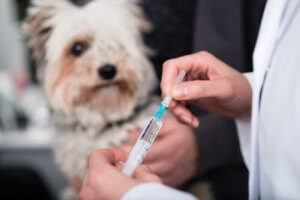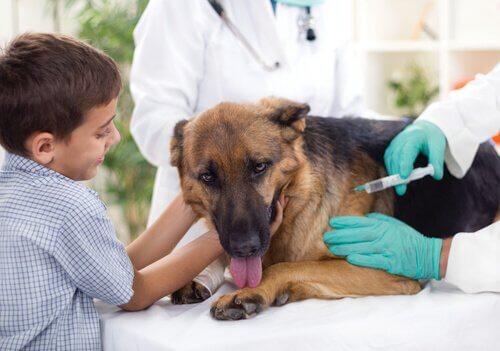Which Are the Most Important Vaccinations for Your Pet?

Pets, especially dogs and cats, have become an important part of many families. Because of this, from the very first moment they arrive at your house, you need to realize just how important it is to look after their health. It’s vital that you know which are the main vaccinations for your pet, as well as knowing when they need to have them.
According to a recent publication in the journal Vaccines, vaccination plays a key role in counteracting undeveloped adaptive immunity in young animals. In other words, it allows the development of antibodies, which are essential to help your pet to fight life-threatening diseases. Read on, and we’ll tell you more about it.
The most important vaccinations for your pet
Essential vaccinations for dogs

As explained in an article published in Vaccines for Veterinarians, vaccines for dogs are divided into essential or basic, and non-essential or less essential. The former are the vaccinations that all dogs should receive, regardless of country or breed. These are the most common ones:
DAPP / DHPP
This is the acronym for the vaccination against distemper, adenovirus, parainfluenza, and parvovirus. It’s one of the most important ones, as these infectious diseases are all highly contagious. Its recommended application is in puppies, but not before they’re 6 weeks old.
Likewise, it’s necessary for them to have this vaccine 3 to 4 times throughout their vaccination program. If the dog is sociable and is out of the house quite a lot, then they should receive the booster every year. If it spends most of the time at home, then every two to three years will suffice.
Rabies
In most countries, the rabies vaccination is mandatory. The reason for this is that the virus that triggers rabies can cause fatal acute encephalomyelitis in humans. It also causes death in dogs within two days of the onset of the first symptoms. It’s estimated that it can take up to 12 weeks from exposure to the virus to the canine showing signs of infection.
Only immunization, followed by boosters, will provide complete protection against this disease. Therefore, its application is recommended every year in more sociable dogs, and every 2 to 3 years in those that spend more time at home.

Other vaccinations for dogs
The need for other vaccines depends largely on the dog’s lifestyle. According to information compiled in Epidemiology and Infection, these may include the following:
- Leptospirosis vaccine. This disease can be contracted by ingesting water that has been contaminated with urine. It’s a bacterial infection that causes symptoms such as fever, vomiting, depression, abdominal pain, and loss of appetite, among others. Annual vaccination is recommended.
- Influenza vaccine. This is essential for all sociable canines, as this disease is so easily transmitted. The symptoms are a bad cough, nasal secretion, sore throat, lack of appetite, and tiredness. Again, annual vaccination is recommended.
- Vaccine for Lyme disease. This vaccine should be administered every year in dogs at risk from tick bites. This disease can cause fever, tiredness, lack of appetite, and mobility difficulties.
Essential vaccinations for cats
As with dogs, the need for vaccines in cats varies according to their living conditions. An article in Vaccines for Veterinarians states that the essential ones are those for feline herpes virus, feline parvovirus, and feline calicivirus. Their vaccination program should also include rabies and feline leukemia vaccines. The booster period is usually annual, especially if the cat usually leaves the house on its own.
What else should you know about vaccinations for your pet?
In general, vaccines don’t usually cause any serious side effects in pets. At most, they may experience mild discomfort or lethargy after receiving the doses. However, it’s advisable to look out for symptoms such as bloating or vomiting. If they appear, it’s best to see a veterinarian.
Remember that other vaccinations may be necessary, and your vet will inform you about these. Liaise with them and be sure to complete the entire vaccination program to ensure your pet’s good health.
Bibliografía
- Dodds WJ. Early Life Vaccination of Companion Animal Pets. Vaccines (Basel). 2021;9(2):92. Published 2021 Jan 27. doi:10.3390/vaccines9020092
- Tizard IR. Canine vaccines. Vaccines for Veterinarians. 2021;153-166.e1. doi:10.1016/B978-0-323-68299-2.00022-8
- Abdelmagid OY, Larson L, Payne L, Tubbs A, Wasmoen T, Schultz R. Evaluation of the efficacy and duration of immunity of a canine combination vaccine against virulent parvovirus, infectious canine hepatitis virus, and distemper virus experimental challenges. Vet Ther. 2004 Fall;5(3):173-86. PMID: 15578450.
- Warrell MJ, Warrell DA. Rabies: the clinical features, management and prevention of the classic zoonosis. Clin Med (Lond). 2015;15(1):78-81. doi:10.7861/clinmedicine.14-6-78
- Wallace RM, Undurraga EA, Gibson A, et al. Estimating the effectiveness of vaccine programs in dog populations. Epidemiol Infect. 2019;147:e247. doi:10.1017/S095026881900115
- Tizard IR. Feline vaccines. Vaccines for Veterinarians. 2021;167-178.e1. doi:10.1016/B978-0-323-68299-2.00023-X
Pets, especially dogs and cats, have become an important part of many families. Because of this, from the very first moment they arrive at your house, you need to realize just how important it is to look after their health. It’s vital that you know which are the main vaccinations for your pet, as well as knowing when they need to have them.
According to a recent publication in the journal Vaccines, vaccination plays a key role in counteracting undeveloped adaptive immunity in young animals. In other words, it allows the development of antibodies, which are essential to help your pet to fight life-threatening diseases. Read on, and we’ll tell you more about it.
The most important vaccinations for your pet
Essential vaccinations for dogs

As explained in an article published in Vaccines for Veterinarians, vaccines for dogs are divided into essential or basic, and non-essential or less essential. The former are the vaccinations that all dogs should receive, regardless of country or breed. These are the most common ones:
DAPP / DHPP
This is the acronym for the vaccination against distemper, adenovirus, parainfluenza, and parvovirus. It’s one of the most important ones, as these infectious diseases are all highly contagious. Its recommended application is in puppies, but not before they’re 6 weeks old.
Likewise, it’s necessary for them to have this vaccine 3 to 4 times throughout their vaccination program. If the dog is sociable and is out of the house quite a lot, then they should receive the booster every year. If it spends most of the time at home, then every two to three years will suffice.
Rabies
In most countries, the rabies vaccination is mandatory. The reason for this is that the virus that triggers rabies can cause fatal acute encephalomyelitis in humans. It also causes death in dogs within two days of the onset of the first symptoms. It’s estimated that it can take up to 12 weeks from exposure to the virus to the canine showing signs of infection.
Only immunization, followed by boosters, will provide complete protection against this disease. Therefore, its application is recommended every year in more sociable dogs, and every 2 to 3 years in those that spend more time at home.

Other vaccinations for dogs
The need for other vaccines depends largely on the dog’s lifestyle. According to information compiled in Epidemiology and Infection, these may include the following:
- Leptospirosis vaccine. This disease can be contracted by ingesting water that has been contaminated with urine. It’s a bacterial infection that causes symptoms such as fever, vomiting, depression, abdominal pain, and loss of appetite, among others. Annual vaccination is recommended.
- Influenza vaccine. This is essential for all sociable canines, as this disease is so easily transmitted. The symptoms are a bad cough, nasal secretion, sore throat, lack of appetite, and tiredness. Again, annual vaccination is recommended.
- Vaccine for Lyme disease. This vaccine should be administered every year in dogs at risk from tick bites. This disease can cause fever, tiredness, lack of appetite, and mobility difficulties.
Essential vaccinations for cats
As with dogs, the need for vaccines in cats varies according to their living conditions. An article in Vaccines for Veterinarians states that the essential ones are those for feline herpes virus, feline parvovirus, and feline calicivirus. Their vaccination program should also include rabies and feline leukemia vaccines. The booster period is usually annual, especially if the cat usually leaves the house on its own.
What else should you know about vaccinations for your pet?
In general, vaccines don’t usually cause any serious side effects in pets. At most, they may experience mild discomfort or lethargy after receiving the doses. However, it’s advisable to look out for symptoms such as bloating or vomiting. If they appear, it’s best to see a veterinarian.
Remember that other vaccinations may be necessary, and your vet will inform you about these. Liaise with them and be sure to complete the entire vaccination program to ensure your pet’s good health.
Bibliografía
- Dodds WJ. Early Life Vaccination of Companion Animal Pets. Vaccines (Basel). 2021;9(2):92. Published 2021 Jan 27. doi:10.3390/vaccines9020092
- Tizard IR. Canine vaccines. Vaccines for Veterinarians. 2021;153-166.e1. doi:10.1016/B978-0-323-68299-2.00022-8
- Abdelmagid OY, Larson L, Payne L, Tubbs A, Wasmoen T, Schultz R. Evaluation of the efficacy and duration of immunity of a canine combination vaccine against virulent parvovirus, infectious canine hepatitis virus, and distemper virus experimental challenges. Vet Ther. 2004 Fall;5(3):173-86. PMID: 15578450.
- Warrell MJ, Warrell DA. Rabies: the clinical features, management and prevention of the classic zoonosis. Clin Med (Lond). 2015;15(1):78-81. doi:10.7861/clinmedicine.14-6-78
- Wallace RM, Undurraga EA, Gibson A, et al. Estimating the effectiveness of vaccine programs in dog populations. Epidemiol Infect. 2019;147:e247. doi:10.1017/S095026881900115
- Tizard IR. Feline vaccines. Vaccines for Veterinarians. 2021;167-178.e1. doi:10.1016/B978-0-323-68299-2.00023-X
This text is provided for informational purposes only and does not replace consultation with a professional. If in doubt, consult your specialist.








